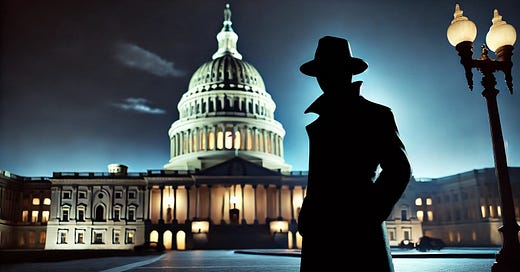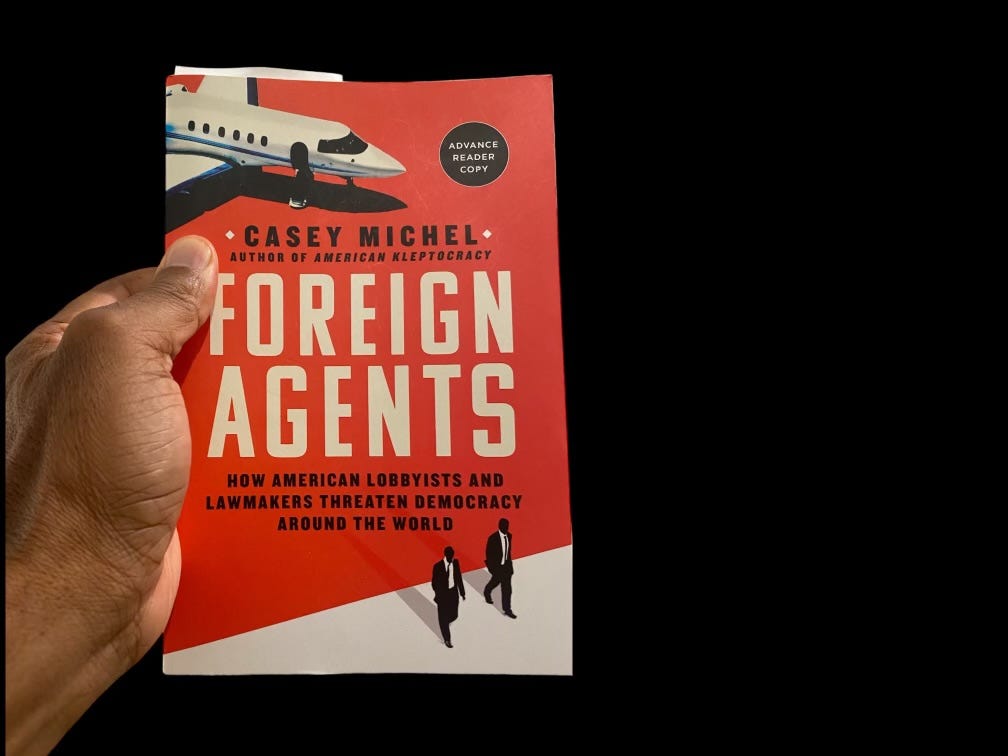Are Foreign Lobbyists Threatening Democracy?
The Riveting New Book That Unearths the Deeper Story
When I first picked up “Foreign Agents: How American Lobbyists and Lawmakers Threaten Democracy Around the World '' by Casey Michel, which will be officially released on August 27th, I expected a humdrum look at the world of hidden lobbying practices.
What I found was a startling, deeply unsettling narrative that forever changed my perception of American democracy and its vulnerabilities.
Michel’s revelations about the insidious activities of foreign lobbyists working within the United States opened my eyes to a world hidden in plain sight, threatening the very foundations of our democratic institutions.
For decades, American legislators turned a blind eye to the burgeoning threat of foreign lobbying. Despite the Foreign Agents Registration Act (FARA) being on the books since 1938, requiring foreign lobbyists to disclose their activities, enforcement was virtually nonexistent.
Michel highlights how these lobbyists operated in the shadows, secretly meeting with lawmakers and influencing public opinion without fear of prosecution. It wasn’t until the 2016 election of Donald Trump, with his questionable links to foreign regimes and inner circle filled with lobbyists like Paul Manafort, that the scale of this threat became undeniable.
Reflecting on this, I realized how naive we had been, assuming foreign lobbyists would never pose a real issue. Michel's words echoed in my mind:
“It was almost too late to stop them—all because American legislators were asleep at the wheel."
As I delved deeper into the book, I was struck by the eerie parallels Michel draws between historical figures like Ivy Lee, the "father of public relations," and modern lobbyists like Manafort. Both men capitalized on their skills to serve the world's most repressive regimes.
Lee’s work for Mussolini, the Soviets, and the Nazis, and Manafort’s involvement with autocrats in Ukraine, the Philippines, and beyond, illustrated a consistent pattern of prioritizing personal gain over democratic values.
Their stories are cautionary tales, not just of personal downfall, but of the profound threat foreign lobbyists like them pose to democracy. Michel’s narrative made me ponder the lengths to which these individuals would go, and the devastating impacts of their actions.
One of the most shocking revelations Michel uncovered is how foreign lobbying influences American foreign policy in favor of anti-democratic regimes. I was particularly disturbed by the examples of Azerbaijan and Egypt, where foreign lobbyists managed to sway U.S. legislators to maintain favorable policies despite these countries' atrocious human rights records.
Michel recounts the case of Senator Bob Menendez, who secretly worked on behalf of Egypt’s dictatorship, highlighting the profound impact of foreign lobbying on American policy. This hit home for me, realizing that these machinations were not just abstract political maneuvers but had real, tangible effects on global and domestic affairs.
Yet, amid the darkness, Michel offers a glimmer of hope. He acknowledges the potential of FARA as a tool for transparency and accountability, emphasizing the need for stricter enforcement and new regulations. His optimism is infectious:
“Thankfully, that's begun changing. And we're starting to see indictment after indictment of American officials who were secretly working with, or even as, foreign lobbyists themselves.”
Michel’s call for broader transparency requirements, restrictions on former officials becoming lobbyists, and increased funding for regulatory agencies felt not only feasible but imperative. His words stirred a sense of urgency in me—these measures are not just possible, they are necessary to safeguard American democracy.
The implications of Michel’s findings for everyday Americans are profound. The erosion of democratic norms and the rise of authoritarian populism threaten the very foundation of our society. I found myself alarmed by Michel’s warning: if unchecked, foreign lobbying could lead to a decline in American democracy, mirroring the descent seen in Hungary under Viktor Orban or Russia under Vladimir Putin.
“We’re going to see something like Vladimir Putin’s Russia, in which a decades-long dictator emerges—with all of the horrors that come with that,” he warns. This stark prediction left me contemplating the future of our country.
Awareness and vigilance, Michel argues, are our first lines of defense. He encourages citizens to explore the FARA database to understand the extent of foreign lobbying and its impact on their local legislators. This transparency is crucial for holding lobbyists and lawmakers accountable.
His concluding words resonate deeply:
“Simply being aware of the scale of the industry—now worth billions of dollars, representing the most heinous regimes around the planet—has to be the first step.”
“Foreign Agents” is not just a book but a wake-up call. Michel’s meticulous research and compelling narrative shed light on the hidden threats posed by foreign lobbyists, urging us to recognize and combat these dangers.
As I closed the book, I felt a renewed sense of responsibility to remain vigilant, to demand transparency, and to advocate for accountability. In an era where the line between domestic and foreign interests is increasingly blurred, Michel’s work serves as a powerful reminder of the importance of protecting our democratic values.
Since January of 2020, Great Books, Great Minds has provided subscribers community, connection and conversation around books for free—no paywall. But our future relies on you. At $6.00/month or $60.00 per year, please help us sustain our vision of impacting one million readers worldwide by 2030.
Diamond Michael Scott, Global Book Ambassador and Influencer







My brother-in-law works for an outfit called American Promise [https://americanpromise.net/] that's attempting to scrub foreign money out of our electoral process. Ultimate goal: A constitutional ammendment that bans corporate and foreign dollars from the election campaigns. We can only hope.
Sounds like a good one to pair with Lee McIntyre’s “On Disinformation”